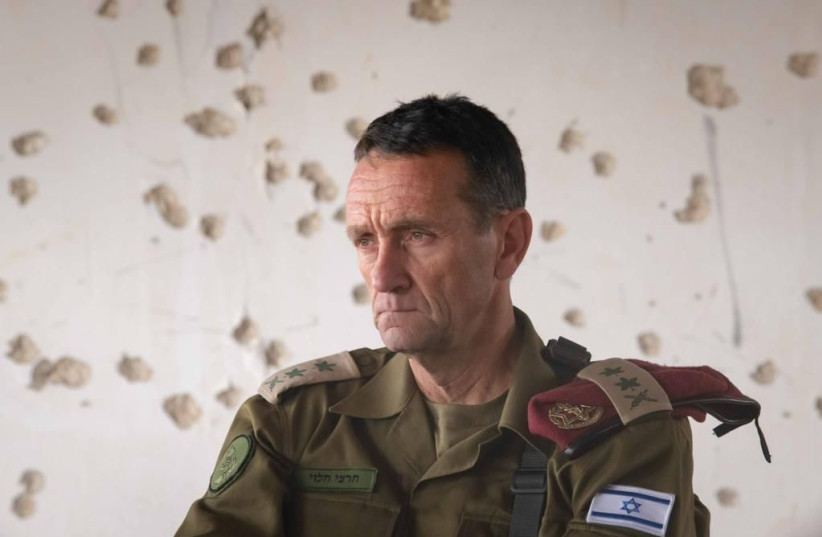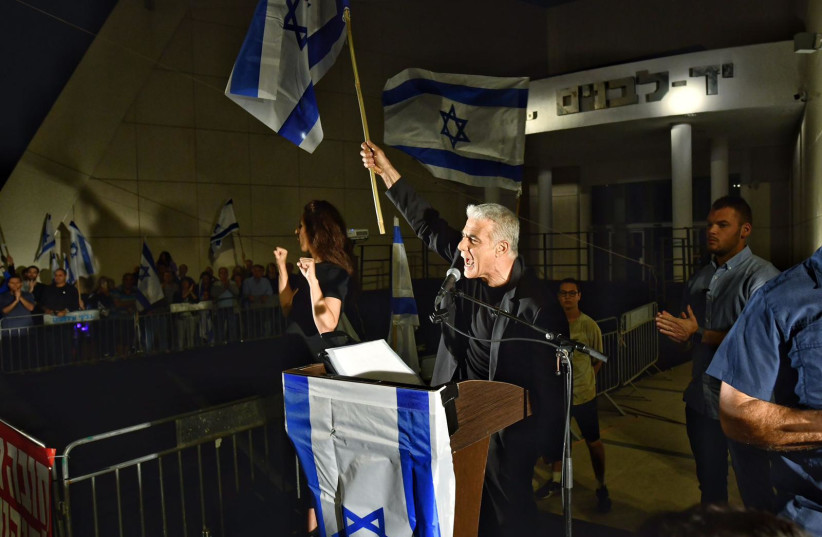IDF chief joins Netanyahu, Lapid call to keep protest outside cemeteries
IDF chief of Staff Herzi Halevi called for judicial reform protests to remain outside military ceremonies on Remembrance Day in a letter published on Sunday morning, joining a similar call made by Prime Minister Benjamin Netanyahu, Defense Minister Yoav Gallant, Opposition leader Yair Lapid, and National Unity leader Benny Gantz in a Friday joint statement.
“It’s on us to respect the cemeteries and not to turn them into arenas of debate,” said Lieutenant-General Halevi. “Restraint and silence have a deafening power, and paying respects for our fallen loved ones isn’t possible with the noise of argument.”
Halevi said that Remembrance Day requires Israeli citizens to unite around it and recognize the connection between them all. The memorial day for Israel’s fallen soldiers, security personnel and victims of terrorism establishes a connection between the personal and national.
“Many families in Israel are hurting because the bereavement has no address; It can knock on the door of any family whose sons and daughters serve in the military,” Halevi continued.
“Restraint and silence have a deafening power, and paying respects for our fallen loved ones isn’t possible with the noise of argument.”
Herzi Halevi
Halevi called for focus on the memories of the fallen, recalling in his open letter the memory of fallen IDF soldier Jonathan Boyden, who was mortally wounded in Lebanon in 1993 while serving with the anti-tank Paratrooper company. The Chief of Staff said that he had met with Boyden when he interviewed for a position with the “Orev” unit, and that the oleh from Britain had spoken about his desire to be a warrior and protect Israel.
 IDF Chief of Staff Herzi Halevi. (credit: IDF SPOKESPERSON’S OFFICE)
IDF Chief of Staff Herzi Halevi. (credit: IDF SPOKESPERSON’S OFFICE)“[Boyden] loved life, and was right to risk it for the sake of the country,” said Halevi. “Our independence is shaped in this place, where the choice of life meets the willingness to die for the defense of the country.”
Halevi said that he is conscious of how Boyden and other families continue to hurt over the loss of their loved ones.
Netanyahu, Lapid, Gallant and Gantz issued their own statement on Friday through the efforts of Eli Ben-Shem, a bereaved father and chairman of Yad Lebanim, which works to support mourning families and help commemorate Israel’s fallen soldiers.
Respect for Remembrance Day
The politicians said that their statement came out of respect for Remembrance Day and the memory of the fallen, and requested all Israeli citizens, “from the depth of our hearts, leave the controversy this Remembrance Day outside the military cemeteries.”
“This is a day for silencing out controversy, all of us, and making room for pain and memory,” said the Israeli leaders. “The holiness of the fallen and the respect that we feel for the bereaved families connects us together — over the graves of our loved ones, we’re all brothers. We’re all one nation.”
Remembrance Day has been a symbol of unity for the last 75 years of the State of Israel’s existence, the coalition and opposition leaders said, a status which is need in 2023 as well. Those in the cemeteries gave the nation its state, and Israel’s citizens have a moral and national duty to respect them and not make the day any more difficult for those mourning their family and friends.
Over 115 heads of local councils and cities also issued a joint statement on Friday calling for respect for Remembrance Day.
“On Remembrance Day, in the cemeteries and ceremonies throughout the country, we will sanctify the fallen whose deaths granted us our lives in the land of Israel,” said Center for Local Government head Haim Bivas. “We will rally around the bereaved families and give them all the respect they deserve.”
Jerusalem Mayor Moshe Lion said that together with the heads of local government, he called on Israeli citizens “to stop the divisive discourse and unite for everyone to unite behind the bereaved families who lost their dearest ones for the sake of all of our lives.”
Tel Aviv Mayor Ron Huldai called Remembrance Day a holy day and said that they would stand united with the bereaved families.
As the calls for keeping Remembrance Day apolitical continued, there were also indications that strife between members of the coalition and opposition over the judicial reform would continue.
While the judicial reform first proposed in January had been paused, protests continued for the 16th week throughout Israel on Saturday night, with protest organizers claiming that around 380,000 demonstrators had taken to the streets.
Lapid spoke at a demonstration in Hod Hasharon, saying that protesters were fighting for the same democracy and Zionism espoused in the weeks of Holocaust Day, Remembrance Day and Independence Day.
“If you hadn’t taken to the streets, the disaster would have already happened. Israel would have been no longer democratic,” said Lapid. “One day you will tell this to your grandchildren and your great-grandchildren about how in 2023, you marched through the streets wrapped in a flag and saved the State of Israel. How before Independence Day, you fought for your country, you fought and won.”
 Opposition Leader Yair Lapid holds an Israeli flag up high at a judicial reform protest in Hod HaSharon on April 22, 2023. (credit: ELAD GUTMAN)
Opposition Leader Yair Lapid holds an Israeli flag up high at a judicial reform protest in Hod HaSharon on April 22, 2023. (credit: ELAD GUTMAN)Lapid had previously said that he would not participate in the traditional torch lighting ceremony on Independence Day, as a form of protest against the judicial reform and the government.
“I signed the call not to be involved in Holocaust Remembrance Day and Memorial Day in protest,” said Lapid. “I will be, as always, in the military cemetery. Bereavement is where the internal debate must not be allowed to enter. In the 75th year of the state, we will be sad together, we will only be happy separately.”
Channel 12 reported on Friday that Transportation Minister Miri Regev would attempt to convince Lapid to attend the ceremony to create a message of unity. Lapid had noted that Netanyahu didn’t participate in the ceremony when Yesh Atid’s coalition was in power.
While Regev sought Lapid’s participation, several bereaved families expressed anger on Thursday night at the news that National Security Minister Itamar Ben-Gvir would attend Remembrance Day memorial services at a cemetery in Beersheba.
Some of the families, according to Maariv, had requested that the Knesset Member not attend. Some asserted that while the day was a day for remembering the victims of terrorism, they alleged that Ben-Gvir was involved with terrorists, was investigated by the Shin Bet, and had not served in the military. Some announced that they would sing during Ben-Gvir’s speech.





Comments are closed.